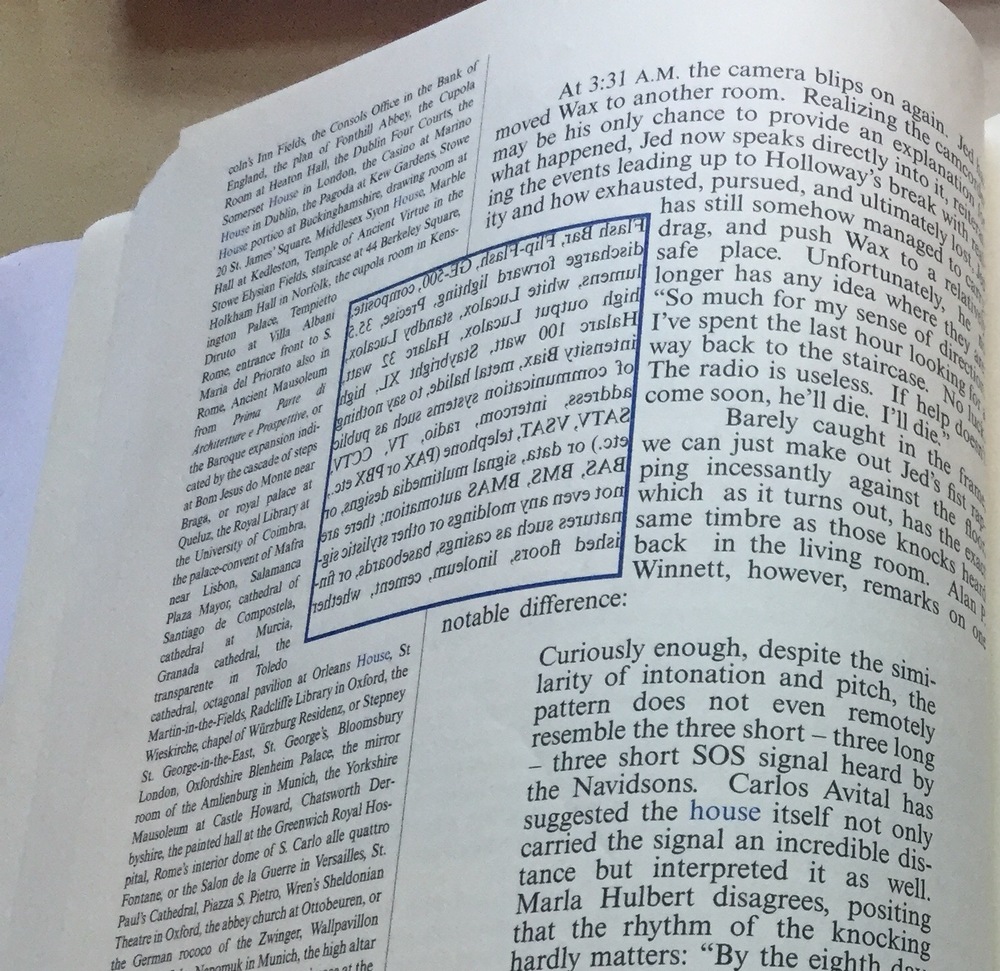Mark Z. Danielewski’s debut novel, House of Leaves (2000), is an arrogant book. It asks readers to not only surrender their understanding of physical space, or even their understanding of the horror genre, but their understanding of narrative, narrators, and text (a word which here means both “the contents of the story” and “ink on a page”). There’s a lot of weird stuff going on in the book, but one always has the impression that it’s happening for a reason. To read and finish House of Leaves is to trust Danielewski to be intentional about his experimentation.
The likely reason people endure (and even enjoy) House of Leaves is that, despite its zany methods, it delivers a very clearly-cut story.
Danielewski’s fourth novel, The Familiar, is less easy to grasp. It will be released over the course of 27 volumes, the first of which came out this May. So far, it is about a little girl named Xanther, her parents, and a kitten she finds. Easy enough. But then there’s the Mexican gang, the drug addict in Singapore, the Armenian cab driver, the cartoon character from Venice who appears for only two pages, and two mad scientists in Texas whose roles in this sprawling work are exceptionally vague as of now. One might even argue that barely anything has happened so far.

A page from House of Leaves, which illustrate Danielewski’s visual writing style.
Despite the unwieldiness that comes at the beginning of any 27-volume series, The Familiar is still interesting for a reader who is already familiar with Danielewski’s work. His style (excluding, for now, typographical experimentation) is at its strongest here: he marshalls independent voices for each of the ten narrative perspectives, each of which would be completely distinct from all the others even without their distinct formattings. Still more impressively, each of those voices perfectly reflects each of the characters’ psychologies, which are also exceptionally thick for the beginning of such a long series. All of this:, the syntax, the characters, and the book’s governing psychology, come together to create some frightening themes which creep into focus by the volume’s end.
Still, the first part of The Familiar is fighting an uphill battle in terms of getting its readers to commit to these various storylines. Some of them are readable and hilarious (Shnork) and some of them are well-developed and so psychologically poignant that we stop caring about some of their more annoying tics (Xanther and her family), but others are very hard to follow because of their broken English (Jingjing), and still others are just not very interesting as of yet (Luther). The temptation to skip passages is hard to resist, and the only thing that kept me from doing so was my trust that Danielewski was doing something important with these sections, and that skipping them would bite me in the ass come volume fourteen.

A page from The Familiar, which also reflects danielewski’s signature style.
Danielewski’s trademark is his typographical experimentation, which more or less succeeds here. Some of the tomfoolery is understandable: each narrator has a different typeface as well as a designated color in the corner of the page. Some of the techniques from his earlier work, like placing just a few words on a page in order to encourage faster page turning, thereby increasing the sense of urgency, feel completely at home here. The purpose of some of the other components of the experimentation are still incomprehensible, though, such as the entire first forty-three pages, some of which is very pretentious prose about death and war and such. Some narrators only use very small parts of the page for their writing, and the few full-color two-page spreads which seem to lack any context are also indecipherable as of yet. This is not necessarily a bad thing, but it is something that may become tiring.

The first volume of the familiar, subtitled “one rainy day in may,” was released this may. volume two, “into the forest,” is due out october 24, 2015.
A reader’s willingness to A) take this book out of the library; B) finish it (which, despite its size, won’t take too long, because of the formatting); and C) wait eagerly for Volume 2, says much more about the reader than it does about the book itself. It’s a question of trust–whether you expect that Danielewski will successfully pull all that is unclear into focus and whether you think that all of his whackiness does have purpose. The Familiar promises to be an incredible novel, but only a reader who believes in Danielewski (and, to a certain degree, believes in experimental literature’s ability to deliver effective stories by virtue of their jazzing around, rather than in spite of it) will ever think so.
If this is a field that is completely unfamiliar to you, read some other experimental literature first, then read House of Leaves, then The Familiar. This recommendation carries with it the frustrating (and unoriginal) undertone that some people are not smart or experienced enough to read certain books. This is not necessarily the case. In all cases, trust is something which must be earned. You would not lend your car to a complete stranger. You would, however, lend your car to someone you have known for several years. Don’t let Mark Danielewski drive your car until you know he’s a good driver–he’s planning on borrowing it for quite some time.
Jeremy Levine is a recent graduate of Clark University, where he now works. He enjoys folk music and burritos.
